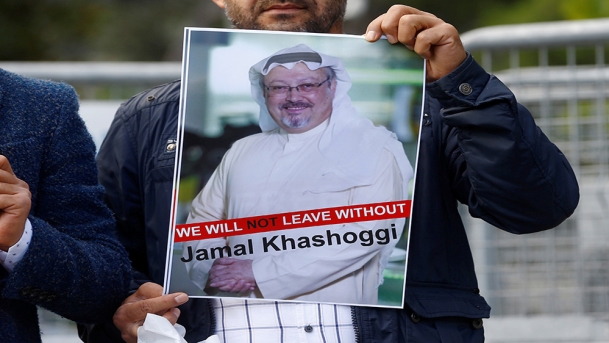
At 1 pm on 2 October 2018, prominent Saudi journalist Jamal Khashoggi entered the Saudi consulate in Istanbul for a scheduled appointment to obtain documentation needed for his impending marriage. He never left.
In voluntary exile in the United States since 2017, Khashoggi, long known for his closeness to the Saudi elite, had become a vocal critic of Saudi Crown Prince Mohammed bin Salman (known as MBS), who has cultivated an image at home and abroad as a dynamic young reformer. Khashoggi’s disappearance quickly became an international cause célèbre, and as media coverage expanded, and grisly reports of dismemberment emerged, major Western states began pointing the finger at Saudi Arabia—particularly MBS—calling on the kingdom to disclose Khashoggi’s fate or face sanctions. Though Khashoggi’s remains have not yet been found, statements from Turkish investigators leave no doubt that he was murdered in the consulate.
What are the consequences of his disappearance for Saudi Arabia and its de facto ruler, MBS? How the Khashoggi affair plays out will largely depend on the motivations and calculations of three major players: Turkey, the United States and Saudi Arabia itself.
Of course, Saudi Arabia is keen to salvage its reputation, interests and international relations. MBS has worked hard to burnish his reformist credentials to the international community, undertaking high-profile moves like lifting the ban on women driving. The Khashoggi assassination seriously eroded this image. This puts the kingdom’s allies and MBS boosters in a tight spot, wondering if they should disassociate themselves from the kingdom to best preserve their own reputations. The economic repercussions are already being felt in the kingdom, as numerous parties slated to attend its investment conference in late October—‘Davos in the desert’—pulled out.
In the United States, the Trump administration has forged a close alliance with Saudi Arabia—and MBS in particular—seeking to isolate Iran and also secure Saudi investments in the US. Khashoggi’s assassination has called this partnership into question. The killing has become a live political issue in the US, just ahead of the midterm Congressional elections, with both Republicans and Democrats demanding answers from MBS. The Trump administration may therefore need to choose between continued support of MBS to preserve its significant economic interests and letting the investigation into the killing proceed unimpeded wherever it may lead, even if it results in sanctions on Saudi Arabia, as some legislators are demanding.
In Turkey, President Erdogan must respond to this flagrant breach of sovereignty. At the same time, he now has an opportunity to pressure Saudi Arabia for concessions on various regional issues of special interest to Turkey, such as Saudi contacts with Kurdish leaders that Turkey considers terrorists and the Saudi blockade on Turkey’s Qatari ally. In particular, the assassination has undermined Saudi Arabia’s ostensible justifications for the Qatar blockade. Having accused Qatar of breaches of sovereignty and interference in other states’ affairs, Saudi Arabia is now exposed to these same accusations and global sympathy may swing toward Qatar.
In light of these considerations, there are two possible scenarios. Most likely is that Saudi Arabia claims responsibility for the assassination but portrays it as an accident or a rogue operation conducted without MBS’s knowledge. There are already reports that MBS will use this cover story to remove potential competitors. This trajectory would serve the Trump administration’s goal of preserving its partnership with Saudi Arabia and allow it to plausibly maintain that Khashoggi’s killers had been brought to justice. It could also appease angry members of Congress. While this move could satisfy Turkey—especially if it included an official Saudi apology—it means Turkey would forgo the chance to extract concessions from Saudi Arabia on sensitive regional issues.
Though less likely, a second outcome could be the sidelining of MBS. This scenario is more likely if Turkey shows it has incontrovertible proof of MBS’s involvement in the killing. Such an outcome would better suit Turkey, but in the US, it could pit the MBS-friendly White House against Congress and the intelligence community, who are now more skeptical of the crown prince.
Within the Saudi royal family, the removal of MBS would be met with stiff resistance. King Salman would likely only agree under two conditions. First, if the Trump administration radically shifted its position under pressure from Congress, US intelligence agencies, and the media, Salman’s hand might be forced. Second, influential parties within the Saudi ruling family itself must sanction the ouster. This is possible if they believe that keeping MBS in power would isolate the kingdom and severely damage its security, stability and international standing.
The crown prince, however, would not go quietly and would resist this option with all the power he could muster, whatever the cost.
ــــــــــــــــــــــــــــــــــــــــــــــــــــــــــــــــــــــــــــــــــــــــــــــــــــــــــــــــــــــــــــــــــــــــــــــــــــــــــــــــــــــــــــــــــــ
*This is a summary of a policy brief originally written in Arabic, available here: http://studies.aljazeera.net/ar/positionestimate/2018/10/181018143757719.html